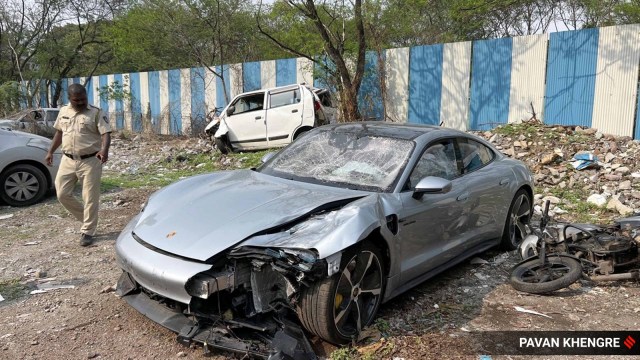
While the country mourns the loss of two young lives and shares the grief of the families whose children were mercilessly mowed down by an irresponsible youth in Pune, we also stare at the stark reality of a defunct criminal justice system. If the drunk rich boy was reckless, one wonders how responsible was the Juvenile Justice Board that handled his criminal act with kid gloves.
There is something very wrong in the way we deal with irresponsible driving, road safety and accidents. Citizens responding to the current case are flagging the equally tragic loss of life in an accident involving film actor Salman Khan in 2002. The case ended 13 years ago with the accused being acquitted. Herein lies the root cause of the problems that ail our criminal justice system — it takes years to deliver verdicts, emboldening some people to take the law into their own hands or flout it the way the youth driving the Porsche in Pune did.
Scant respect for the law of the land is the direct result of long delays in trials. Were criminal trials to be concluded within a year with appeals being heard and disposed in another year, the situation would be different. There would be respect for the law. Parents would be scared to hand over car keys to minors and bartenders would be equally careful in serving alcohol to them.
However, the current scenario is just the opposite. ‘Crime in India (2022)’ published by the National Crime Records Bureau (NCRB) shows that more than 90 per cent cases of deaths due to negligent driving and hit and run cases are pending in courts with the conviction rate being as low as 30 per cent in metropolitan cities. It is only slightly better in the rest of India.
Delays result in the police not being able to trace witnesses when trials do start eventually, and citizens do not recollect the sequence of events in courts. These damage the prosecution of criminal cases. The general impression is that while the judicial processes are time consuming and cumbersome in India, many criminals go scot-free. One wonders why the state and central governments are not investing in judicial infrastructure to ensure speedy trials.
In December 2023, Parliament was informed that India has 21 judicial officers per one million of population as against the Law Commission’s (1987) recommendation of 50 judges per million. Similarly, police population ratio is around 152 per lakh citizens while the internationally accepted norm is around 222 per lakh. The ‘Data on Police Organisation as on January 1, 2022’, recently released by the Bureau of Police Research and Development (BPR&D), shows around four lakh vacancies of police persons in the country. Despite the low ratio and high rate of vacancies, the disposal of criminal cases by state police organisations is fast – there is much scope for improvement in quality, though.
‘Crime In India 2022’ indicates that 75 per cent cases of deaths in road accidents due to rash and negligent acts and 65 per cent of hit and run cases had been charge-sheeted by police within a year. More investigating officers and prosecutors, their regular training in use of technology and well-equipped forensic laboratories will no doubt lead to an improved detection rate, better-quality investigation, and the conviction of the accused.
The current case has also brought the role of juvenile justice boards to public scrutiny – this is an arena that rarely stirs the curiosity of citizens. The Juvenile Justice (Care and Protection of Children) Act, 2015, allows for children between 16-18 years of age who are accused of heinous crimes to be tried as adults under the Indian Penal Code. Surprisingly, the Board in the case in Pune is reported to have released the accused youth within hours, asking him to write an essay on accidents, work with traffic police for 15 days and undergo counselling against drinking. It is a mockery of justice and a cruel joke when two precious young lives were lost. The Pune Police has filed the case as culpable homicide not amounting to murder — a serious offence with 10 years imprisonment and has a relatively better conviction rate of around 40 per cent. I am sure the instant order of the JJ board Pune will be examined and appropriate action taken by the authority concerned. The Board has meanwhile asked the minor to reappear before it. The Maharashtra government’s decision to try the Porsche driver as an adult is a step in right direction.
The unfortunate case and loss of innocent young lives has shaken us out of our apathy to various factors of road safety and responsible driving, just as the case of the December 2012 rape case led to outrage against violence inflicted on women. I hope this would lead to citizens’ acceptance of their own accountability vis-a-vis traffic rules and to their role as responsible parents. And that law, if not ethics, would deter those indulging teenagers with drugs and alcohol in bars and cafes. Let young victims Aneesh Awadhiya and Ashwini Koshta be remembered for bringing road justice in focus.
This is possible only if the criminal case of Pune is taken to its logical conclusion and done so expeditiously.
The writer, an IPS, retired as DG Bureau of Police Research & Development


